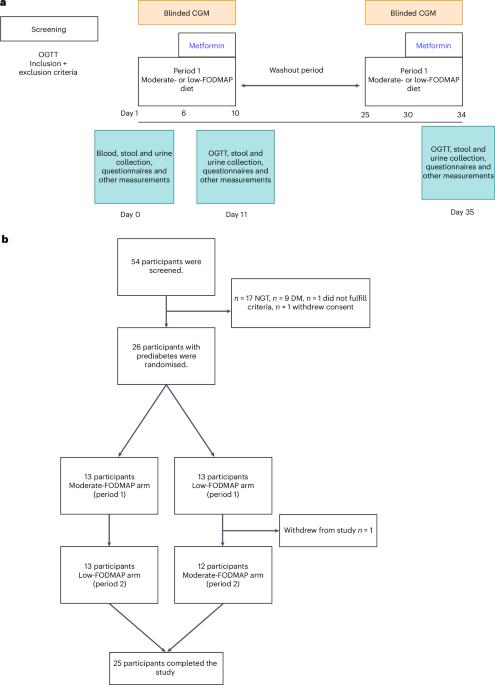Combining a diet rich in fermentable carbohydrates with metformin improves glycaemic control and reshapes the gut microbiota in people with prediabetes
IF 20.8
1区 医学
Q1 ENDOCRINOLOGY & METABOLISM
引用次数: 0
Abstract
Metformin efficiently lowers blood glucose levels but leads to gastrointestinal side effects. However, whether dietary interventions can improve metformin tolerability and glucose-lowering efficacy remains unknown. Here we investigate the effects of pretreatment with a diet rich in fermentable oligosaccharides, disaccharides, monosaccharides and polyols (FODMAPs) in combination with metformin on postprandial glycaemia and gut microbiota in people with prediabetes. In a double-blind, randomised, crossover trial, 26 individuals with prediabetes received an isocaloric diet with moderate or low FODMAPs for 10 d, concomitantly with metformin for 5 d, separated by a washout period of 2 weeks. The primary endpoint is the difference in postprandial glycaemia assessed by total postprandial incremental area under the curve through continuous glucose monitoring. Secondary endpoints are differences in glucose, insulin and glucagon-like peptide 1 (GLP-1) levels after an oral glucose tolerance test, gut microbiota, gastrointestinal symptoms and body weight. We show that moderate FODMAPs with metformin, as compared with low FODMAPs with metformin, result in lower postprandial glycaemia, higher GLP-1 secretion and higher Butyricimonas virosa abundance. We also show that a higher baseline abundance of Dorea formicigenerans predicts gastrointestinal intolerance to metformin. These findings have implications for personalizing nutritional and pharmacological interventions to prevent diabetes. ClinicalTrials.gov registration: NCT05628584 . In this double-blind, randomised, crossover trial, a diet rich in fermentable foods was shown to improve the glucose-lowering efficacy of metformin due, at least in part, to changes in gut microbiota composition.


将富含可发酵碳水化合物的饮食与二甲双胍结合起来,可以改善糖尿病前期患者的血糖控制,重塑肠道微生物群
二甲双胍能有效降低血糖水平,但会导致胃肠道副作用。然而,饮食干预是否能提高二甲双胍耐受性和降糖效果尚不清楚。本文研究了富含可发酵低聚糖、双糖、单糖和多元醇(FODMAPs)的饮食预处理与二甲双胍联合使用对糖尿病前期患者餐后血糖和肠道微生物群的影响。在一项双盲、随机、交叉试验中,26名前驱糖尿病患者接受中等或低FODMAPs等热量饮食10天,同时服用二甲双胍5天,中间间隔2周的洗脱期。主要终点是通过连续血糖监测,通过餐后曲线下总增量面积评估餐后血糖的差异。次要终点是口服葡萄糖耐量试验后葡萄糖、胰岛素和胰高血糖素样肽1 (GLP-1)水平的差异、肠道微生物群、胃肠道症状和体重。我们发现,与低FODMAPs与二甲双胍相比,中等FODMAPs与二甲双胍相比,导致较低的餐后血糖,较高的GLP-1分泌和较高的丁酸单胞菌病毒丰度。我们还表明,较高的基线丰度预示着胃肠道对二甲双胍的不耐受。这些发现对个性化营养和药物干预预防糖尿病具有启示意义。ClinicalTrials.gov注册:NCT05628584。
本文章由计算机程序翻译,如有差异,请以英文原文为准。
求助全文
约1分钟内获得全文
求助全文
来源期刊

Nature metabolism
ENDOCRINOLOGY & METABOLISM-
CiteScore
27.50
自引率
2.40%
发文量
170
期刊介绍:
Nature Metabolism is a peer-reviewed scientific journal that covers a broad range of topics in metabolism research. It aims to advance the understanding of metabolic and homeostatic processes at a cellular and physiological level. The journal publishes research from various fields, including fundamental cell biology, basic biomedical and translational research, and integrative physiology. It focuses on how cellular metabolism affects cellular function, the physiology and homeostasis of organs and tissues, and the regulation of organismal energy homeostasis. It also investigates the molecular pathophysiology of metabolic diseases such as diabetes and obesity, as well as their treatment. Nature Metabolism follows the standards of other Nature-branded journals, with a dedicated team of professional editors, rigorous peer-review process, high standards of copy-editing and production, swift publication, and editorial independence. The journal has a high impact factor, has a certain influence in the international area, and is deeply concerned and cited by the majority of scholars.
 求助内容:
求助内容: 应助结果提醒方式:
应助结果提醒方式:


